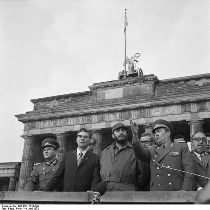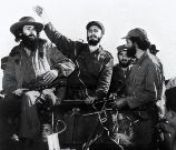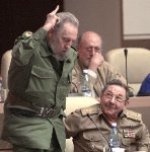Fidel Castro - Detested by Some Worshiped by Some - The Practical Moralist
 Kim Il-Sung is gone. Deng Xiaoping has passed on to those glorious riches in the sky. Hitler, Mussolin, Peron, Khrushchev, Kadar, Franco and
Tito -- all, long departed. But Fidel Castro, like "Ol' Man River," he just keeps rolling along. We know why the Great Mississippi keeps
rolling, but how does Fidel -- now the longest-served leader of any country in the world, and a man who has all but destroyed(?) his country with his
manifold caprices -- do it?
Kim Il-Sung is gone. Deng Xiaoping has passed on to those glorious riches in the sky. Hitler, Mussolin, Peron, Khrushchev, Kadar, Franco and
Tito -- all, long departed. But Fidel Castro, like "Ol' Man River," he just keeps rolling along. We know why the Great Mississippi keeps
rolling, but how does Fidel -- now the longest-served leader of any country in the world, and a man who has all but destroyed(?) his country with his
manifold caprices -- do it?
Fidel Castro, who has stepped down as Cuba's president last year in 2008, has run the country for so long that nearly three-quarters of its people have known no other leader.He stood tall in the eye of Imperial storm head high and moral imagination unwavering for 50 years. In this process he outlasted no fewer than ten American presidents 23 US congresses and countless head of CIA - since he took power in 1959.He took control of Cuba by force and remained its dictatorial leader for nearly five decades. As the leader of the only communist country in the Western Hemisphere, Castro has been the focus of international controversy.
A few Questions About Cuba, which answer how Fidel Managed it?
Why must Cuba, a little island within firing range of the United States’ armed forces and 84 times smaller than its adversary – a poor little island off the coast of Florida, perennially threatened by the most powerful empire in human history – resist U.S. imperialism? Why must Cuban doctors be dispatched to Pakistan when a terrible earthquake devastates its northern regions, even though Cuba, the beleaguered little country, has no geopolitical stakes in that country – or anywhere else? Why must numerous Cubans give their lives in Angola to secure the freedom of that Portuguese colony against invasion by the Apartheid regime of the South Africa of that time? Why should Cuban health personnel be active in 18 different countries even today, saving numerous lives, without seeking property or even payment, in those countries? Why must the Cuban government do its utmost to ensure, even in the most difficult decade of its revolutionary life – the 1990s – that every child goes to school and every single household receives enough calories and protein intake to meet what the World Health Organization deems necessary as a minimally healthy diet? And ensure, also, that the nation’s handicapped children have access to education, in special schools – and in homes and hospital rooms if necessary? And why must Cuba offer over a thousand of its doctors and tonnes of its medicines to the U.S. when a hurricane devastates the city of New Orleans, notwithstanding the hundreds of billions of dollars Cuba itself has lost owing to the U.S. embargo?
One of the many things that make Fidel so unique in the history of statecraft is that he constantly connects these practical questions with the moral.
He has the nearly mystical conviction that the greatest achievement of the human being is the proper formation of conscience and that moral incentives, rather than material ones, are capable of changing the world and moving history forward. I believe he is one of the greatest idealists of our time . . .
– Gabriel Garcia Marquez
Marti taught us that ‘all the world’s glory fits in a kernel of corn’. Many times have I said and repeated this phrase, which carries in eleven words a veritable school of ethics.
– From Fidel Castro’s National Assembly address, December 31, 2007.
In spite of all the odds he stood as the head of a nation, that too for a prolonged period of five decades - without revolutions by people, without attacks by foreign countries, without internal unrest, without genocides -- which are a normal feature in all dictator's history. For all this , there is a reason- He worked for the people , he put forward the ethics into governance. Below are few facts which makes him a Unique humanitarian a Real Leader a Practical moralist.
Civil liberties have been whittled away as labor unions lost the right to strike, independent newspapers shut down, and
religious institutions harassed. Castro removed opposition to his rule though executions and imprisonments, as well as through forced
emigration.Brief Biography
Fidel Castro was born on August 13, 1926. He attended Catholic schools before graduating from the University of Havana with a degree in law.Castro grew up in wealthy circumstances amid the poverty of Cuba's people. He was intellectually gifted but more interested in sports than studies
In 1948, Castro married Mirta Diaz Balart, who was from a wealthy family in Cuba. They had one child, Fidelito. The marriage exposed Castro to a wealthier lifestyle and political connections. Castro pursued his political ambitions as a candidate for a seat in the Cuban parliament, but a coup led by General Fulgencio Batista successfully overthrew the government and cancelled the election. Castro found himself without a legitimate political platform and little income with which to support the family. His marriage to Mirta eventually ended in 1955.
Batista set himself up as dictator, solidified his power with the military and Cuba's economic elite, and got his government recognized by the United States. Castro, along with fellow members of the Ortodoxo party who expected to win in the 1952 election, organized an insurrection. On July 26, 1953, Castro and approximately 150 supporters attacked the Moncada military barracks in an attempt to overthrow Batista. The attack failed and Castro was captured, tried, convicted, which he used to make his famous speech, "History Will Absolve Me". Sentenced to 15 years, he was pardoned after just two. He then went into exile in Mexico, where he trained and assembled the 26th of July Movement. He gained support from Che Guevara and others before leaving aboard the Granma to invade Cuba in 1956.
Returning to Cuba, the revolutionaries hid in the Sierra Maestra mountains, gaining support among the peasants. Eventually, Batista was forced to flee in 1959 and Castro took over. Many Cubans left when it became clear that the Revolution was a Marxist one. Economic antagonism from the United States caused Castro to nationalize all American property.
The U.S. agreement not to invade Cuba didn't preclude toppling the Castro regime in other ways. Castro was the target of CIA assassination attempts (an estimated 638 in all, according to Cuban intelligence) over the years. These ranged from exploding cigars, to a fungus-infected scuba-diving suit, to a mafia-style shooting. He took great delight in the fact that none of the attempts ever succeeded. Castro was reported as saying that if avoiding assassination attempts was an Olympic sport, he would have won gold medals.
The CIA even tried to invade Cuba at the Bay of Pigs to remove Fidel Castro from power, but the Cubans successfully fought it off. As a result, Castro became closely aligned with the Soviet Union. The Soviets bought large amounts of sugar and supplied Cuba with economic and military assistance. This money fueled many of Castro's social programs, such as his war on illiteracy and free universal health care. Unfortunately, aligning Cuba with the USSR only led to more friction between Cuba and the United States.
In 1961, Castro met Dalia Soto del Valle. Castro and Dalia had five children together and finally married in 1980.
In 1962, Cuba was the center of world focus when the U.S. discovered the construction sites of Soviet nuclear missiles. The struggle that ensued between the U.S. and the Soviet Union, the Cuban Missile Crisis, brought the world the closest it ever came to nuclear war.
Over the next four decades, Castro ruled Cuba as a dictator. While some Cubans benefited from Castro's educational and land reforms, others suffered from the food shortages and lack of personal freedoms. Hundreds of thousands of Cubans have fled Cuba to live in the United States.
Having relied heavily on Soviet aid and trade, Castro found himself suddenly alone after the downfall of the Soviet Union in 1991. With the U.S. embargo against Cuba still in effect, Cuba's economic situation suffered greatly in the 1990s. The U.S. then tightened its embargo and speeded up internal sabotage, sensing a great opportunity.
Yet Castro has been very adept at keeping control of the government during these dire economic times. He pressed the United States to lift the economic embargo, but it refused. Castro then adopted a quasi–free market economy and encouraged international investment. He legalized the U.S. dollar and encouraged tourism. He visited the United States in 1996 and invited Cuban exiles living in there to return to Cuba to start businesses.
The 1996 Helms-Burton Bill, which greatly extended all the draconian practices, was signed into law by Bill Clinton.
In 2005, just as Fidel was giving his inspiring speech on Cuba’s role in securing health and sight for the Latin American masses, the National Intelligence Council of the CIA added Cuba to the secret list of countries where the U.S. may have to intervene militarily in the near future.
In 2008 handing over the power to his brother and getting out of the Presidentship of the Cuba, he gave these cryptic statements
- “I will neither aspire to nor accept the positions of the President of the State Council and Commander-in-Chief”;
- “My elementary duty is not to cling to positions, much less to stand in the way of younger persons”;
- “It would be a betrayal of my conscience to accept a responsibility requiring more mobility and dedication than I am physically able to offer”; and
- “This is not my farewell to you. My only wish is to fight as a soldier in the battle of ideas.”
His role “as a soldier in the battle of ideas” takes the overt form now of virtually daily columns in national newspapers, in which he reflects upon his own life, the revolutionary process in Cuba, imperialist strategies, problems faced by other countries of Latin America as well as the most general problems faced by the whole of humanity. For example, Fidel was undoubtedly the first head of state in the world who said, as early as 1992, that future of the human species itself is now at stake owing to the ecological disaster that has been caused by profit-based industrial production and the culture of consumerism which such production and accumulation entails.
The dispute continues, some call him as the worst leader, a merciless human but some rever him as the the practical morarist , the one who invented science of socialism. But one fact remains he was the long standing leader of a nation for fifty years which is a remarkable feat even must not have been achieved by the greats of Ancient Kingdoms also. Within Latin America, meanwhile, numerous governments and leaders, from Allende to Aristide, from the Sandinistas to Hugo Chavez, from Morales to Kirchner and Lula — from countries small and large — stand in awe of him, as the Grand Old Man of the Latin American Revolution, even though quite a few of them simply lack the guts to follow in his footsteps.
Few links about this Living Legend (even though controversial)... The Frontline Magazine's Cover Story on Fidel Castro , The Text of Some of his Famous speeches.



